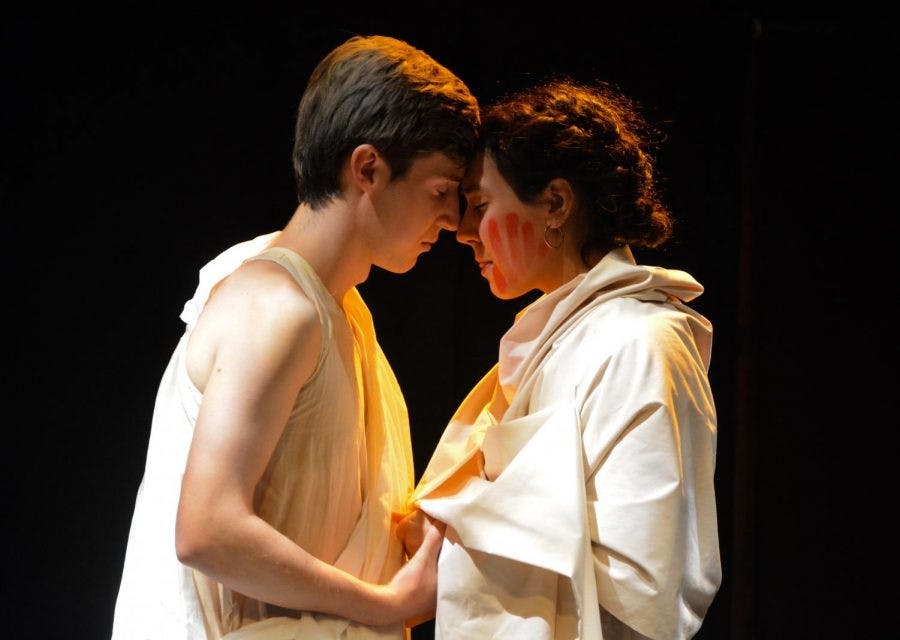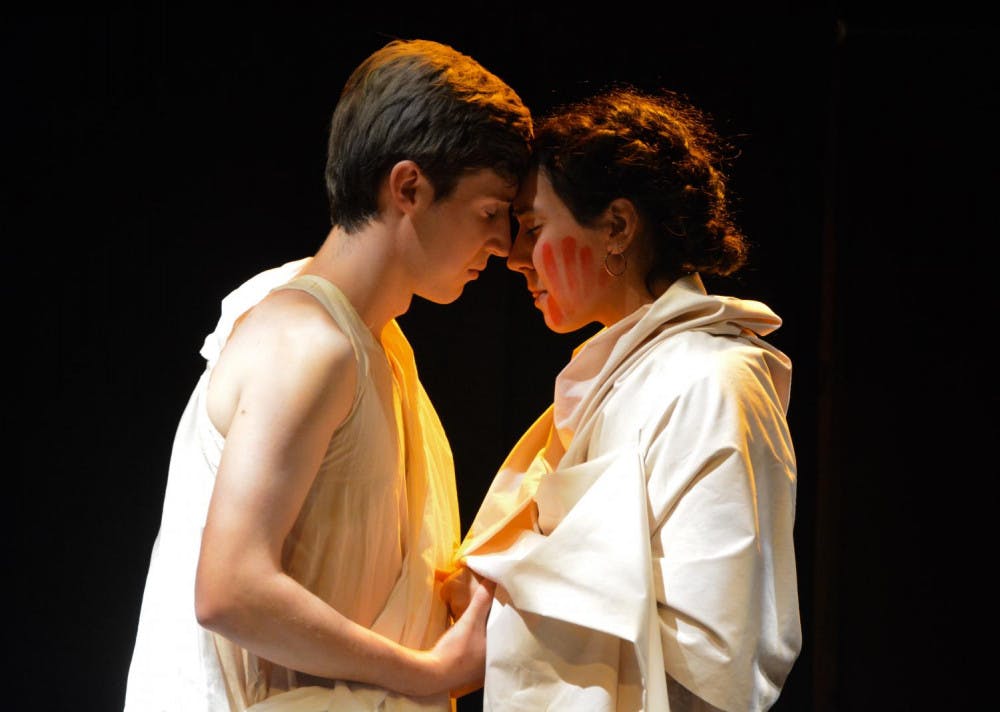The way that Coralie Tyler ’20, writer and director of “Imperator,” describes the Cleopatra of her play is surprisingly similar to how many students might describe themselves.
“She’s just trying to figure things out and look for an answer,” Tyler said. “Imperator” ran from Nov. 8 to 10 in the Hepburn Zoo, and is set after the Battle of Actium. Starring Charlotte Cahillane ’19.5 and Ryan McCrorey ’20 as Cleopatra and the spirit of Julius Caesar, respectively, “Imperator” is a play that, while depicting a conversation from over 2,000 years ago, has modern resonance.
Consisting of only one act, “Imperator” is intentionally about a single moment. A director’s note in the program reminds viewers of the significance of a moment, of everything that can change or be lost within one. This “single moment” structure allows Cleopatra to reflect on every second of her past and all the minutes of her future as she makes an incredibly pivotal decision.
At the same time, the “moment” is separate from the chaos of Cleopatra’s life post-Battle of Actium, and allows a rare period of contemplation in the hectic, high-stakes life of the ancient ruler. The set reflects this unusual stillness, dark and dotted with warm candles, centered around a casket that protrudes into the audience, blurring the line between stage and spectator. The casket represents the sarcophagus of Alexander the Great, which is frequently a point of contemplation for the characters. Cleopatra and Caesar are clothed in white robes, and the pristine brightness of the robes and black of the set are only marred by a red, bloody handprint on the cheek of Cleopatra.
The most striking thing about the moment depicted in “Imperator” is that the audience already knows that there is no happy ending, no beautiful reconciliation in store — Caesar is already dead and the tragic fate of Cleopatra is well-known. However, in the fifty minutes during which the audience experiences this reunion and reflection, it is easier to imagine that she is a woman with a lot of options, a woman who controls her own fate.
Unfortunately, as Cleopatra realizes, “We are merely mortals who act like gods.”

Tyler wrote "Imperator" after being inspired by her History of Rome course.
“I felt like Cleopatra expects a lot of herself and other people and refuses to accept anything less than she deserves,” Cahillane said of her character. “Having the chance to portray such a dynamic and historically monumental individual was something I never expected and I hope that my depiction did her justice.”
Tyler, a theater and film joint major, wrote “Imperator” in a Playwriting I class with Professor Dana Yeaton seven months ago. The events of the play were inspired by Tyler’s experience in a History of Rome class with Professor Jane Chaplin in her first year where she learned about the complex lives of Cleopatra and Caesar.
“If those two were to meet again after everything that’s happened, what would they talk about? What would they get into given the nature of their relationship?” Tyler said.
It’s not easy for a playwright to put their vision out into the world, or to translate it from paper to the stage. Tyler wasn’t exactly planning to direct “Imperator,” but after re-drafting the script a couple of times over the summer, she convinced herself that she had already written something that she liked and that she would have fun with.
“I remember looking at the script for ‘Imperator’ and thinking, ‘It would be really nice to put it up,’ but it just felt so special, like I was looking at a baby of sorts,” Tyler said. “I was hesitant to touch it at first.”
This hesitation didn’t stop the show from coming together. “It was clear from the start that [Tyler] wanted this to be a project that we could relate and connect to and have fun creating,” Cahillane said. “Coralie’s motivation and drive were palpable during each of our rehearsals.”
From start to finish, putting on “Imperator” took roughly seven months, from the writing of the script, to putting together a crew, to rehearsals and the opening night. Over the summer, Tyler began working with stage manager Hannah Abdelaal ’21 and the design team, made up of sound designer Caroline Harrison ’19.5, oratory consultant Khan Kim ’19, costume designer Merri McMahon ’18.5 and lighting designer Allyson Stevens ’19.
With all the energy of a student-produced performance, and the detail and power of a gifted playwright, Tyler’s “Imperator” exists in the space between ancient and modern times. The set, performances and script come together to transport audiences to the classical world, but also allow them to contextualize their own lives.
One of Cleopatra’s final sentiments may not reach audiences in its specific content, but it will in its message: “What is the point of ruling the world if you can’t share it with the ones you love?”

Riley Board '22 is the Editor in Chief of The Campus. She previously served as a Managing Editor, News Editor, Arts & Academics Editor and writer.
She is majoring in Linguistics as an Independent Scholar and is an English minor on the Creative Writing Track.
Board has worked as a writer at Smithsonian Folklife Magazine and as a reporter for The Burlington Free Press. Currently, she is a 2021-2022 Kellogg Fellow working on her linguistics thesis. In her free time, you can find her roller skating in E-Lot or watching the same sitcoms over and over again.




